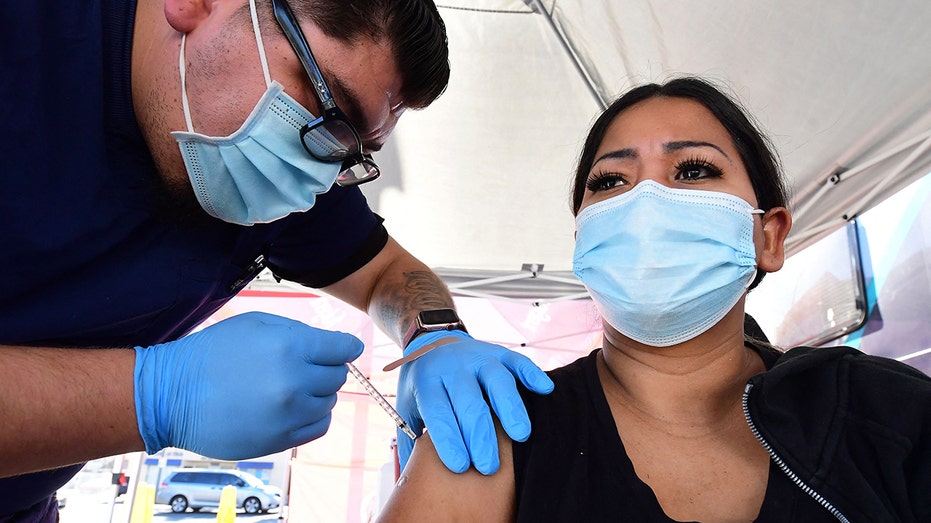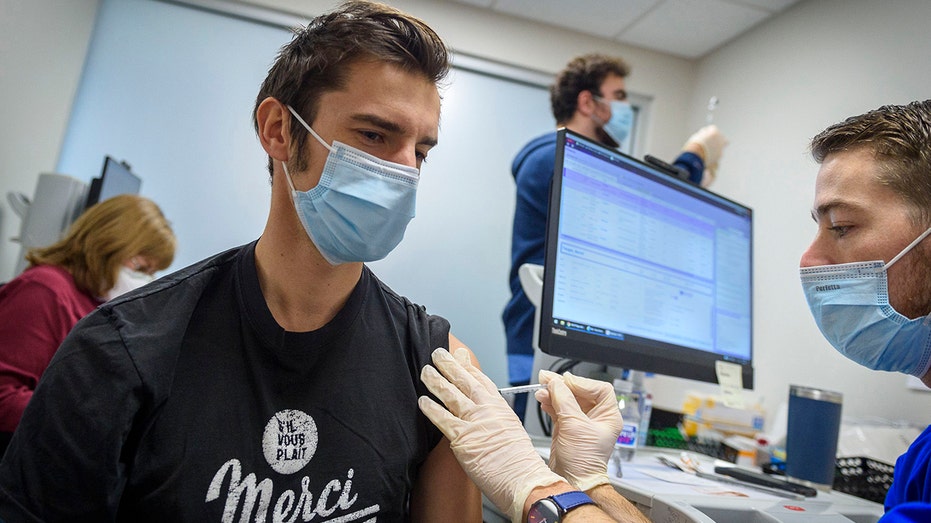COVID-19 omicron uptick prompts more Americans to get booster shots
54% of Americans are more likely to get a booster shot because of the omicron variant
Fox Business Flash top headlines for December 22
Check out what's clicking on FoxBusiness.com.
A recent rise in Covid-19 cases driven by the Omicron variant is prompting more vaccinated Americans to consider getting booster shots, but it doesn’t appear to be persuading large numbers of the unvaccinated, survey data shows.
Among vaccinated adults who haven’t had a booster shot, 54% are more likely to do so because of Omicron, according to a survey released by the Kaiser Family Foundation Tuesday. Of unvaccinated respondents, 12% said the fast-spreading variant’s emergence would make them more inclined to get their first shot.
The U.S. has recently been adding about 1.6 million new vaccine shots a day, up from about 1.4 million before Thanksgiving, according to data from the U.S. Centers for Disease Control and Prevention. The recent doses include boosters and recently eligible children under 12, making it difficult to discern the reasons people are getting shots.
CONSUMER CONFIDENCE ROSY, BUT COVID, INFLATION REMAIN HEADWINDS

Carmen Penaloza receives her first dose of the Pfizer Covd-19 vaccine at a pop-up clinic offering vaccines and booster shots in Rosemead, California on Nov. 29, 2021. ( FREDERIC J. BROWN/AFP via Getty Images / Getty Images)
Of Americans 5 or older who are eligible to be vaccinated, 65.5% are fully vaccinated, according to the CDC. About one-third of fully vaccinated adults have received booster shots.
Half of those surveyed in the Kaiser Family Foundation survey—which polled 1,065 adults between Dec. 15 and Dec. 20—said they worried they would become seriously ill from Covid-19. That is up from 30% who expressed such concerns in a similar survey in November, before the news of the Omicron variant. The new survey has a margin of error of plus or minus 4 percentage points.
But nearly half of unvaccinated respondents said they couldn’t be persuaded to get the shots no matter what. A report detailing the survey findings quoted a person described as a 23-year-old Black woman in Washington, D.C., as saying, "I feel they are trying to kill us with the vaccine." Another person identified as a 32-year-old white woman in North Carolina told researchers, "Jesus himself would have to come down from heaven and speak with me personally."
The Omicron variant caused an estimated 73% of recent Covid-19 cases in the U.S. for the week ending Dec. 18, the CDC said this week, overtaking the Delta variant. Omicron now accounts for more than 90% of cases in many parts of the country, the CDC said.
Omicron fears are upending life in New York City, with residents lining up at Covid-19 testing sites, some restaurants shutting down and performances on and off Broadway being canceled. The city will offer people a $100 incentive if they get a booster shot at a city site by Dec. 31, Mayor Bill de Blasio said Tuesday.
Anna Hadzimová, a 35-year-old child-care worker who lives in Brooklyn, said she got her booster Friday. "The whole new variant is going crazy, so I just want to protect myself and those closest to me," she said. "I don’t want to take my chances."
Initial findings suggest Omicron spreads faster, evades vaccine-induced antibodies and reinfects more easily than previous versions of the virus. But evidence shows booster shots restore some defenses against it.
"Boosters were important before. They’re more important now," Nirav Shah, director of the Maine Center for Disease Control and Prevention, said at a recent briefing. Maine has been in a sustained Covid-19 surge that began months ago with the Delta variant, and on Tuesday reported its highest hospitalization total of the pandemic.
Maine already has one of the country’s highest vaccination rates and there are anecdotal signs Omicron is pushing more residents to get shots, said Robert Long, spokesman for the state’s CDC.
About 74% of Maine residents age 5 and older are fully vaccinated, and more than 424,000 people have received boosters, according to state data. As in many states, however, the vaccination rates are higher in urban and suburban areas than in rural ones.
Maine’s two largest healthcare systems have added vaccination clinics in the Portland area, Mr. Long said, and smaller clinics have been added in rural areas, including one that gave 271 shots one day last week in the coastal town of Machias.
Omicron fears recently prompted Michelle Alford of Oklahoma City to make a vaccination appointment, a step the 49-year-old had avoided out of procrastination and because she rarely got sick, she said.
But she tested positive for Covid-19 days before her appointment and is now home feeling sick and achy. Ms. Alford plans to get vaccinated once she is fully recovered because she doesn’t think the pandemic will go away soon, she said.
CLICK HERE TO READ MORE ON FOX BUSINESS

West Hartford, Connecticut, resident Benoit Faugas receives a COVID-19 booster shot at Hartford Hospital as hospitalizations reached 500 for first time since April and health leaders have pushed for more vaccinations and booster shots. (Mark Mirko/Hartford Courant/Tribune News Service via Getty Images / Getty Images)
"We thought it would die down a year ago and here it is, a whole new variant," she said. "It’s nonstop."
C. Buddy Creech, director of Vanderbilt University’s Vaccine Research Program in Nashville, Tenn., said he has had "a lot more discussion with my patients and my colleagues about the timing of boosters" as the Omicron variant hits the U.S.
Although Tennessee hasn’t seen a major increase recently in hospitalizations, health workers are worried it is only a matter of time, he said. He hoped people would decide to get vaccine shots, whether their first shots or boosters, before gathering for holiday events, he said.
CLICK HERE TO GET FOX BUSINESS ON THE GO
Kathleen Toomey, commissioner of the Georgia Department of Public Health, said public-health officials and hospitals in states where vaccination rates and booster rates are lower are girding themselves for the arrival of Omicron. In Georgia, about 54% of the eligible population is fully vaccinated, and about one-quarter of that group has received booster shots, according to federal data.
"We have a long way to go, and I hope that this Omicron in some paradoxical way will be an incentive" to get vaccinated or receive a booster, Dr. Toomey said.
This article first appeared in The Wall Street Journal




















